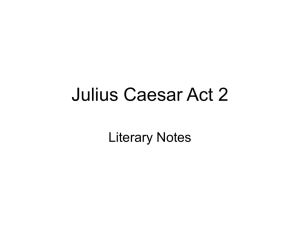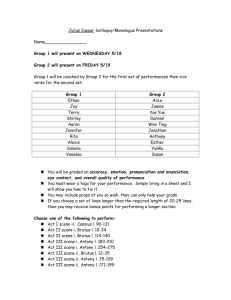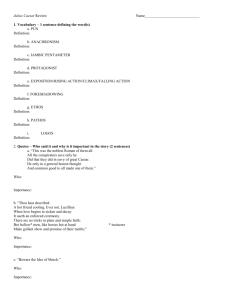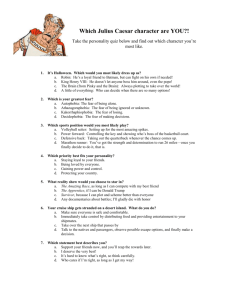Acts II-III Questions
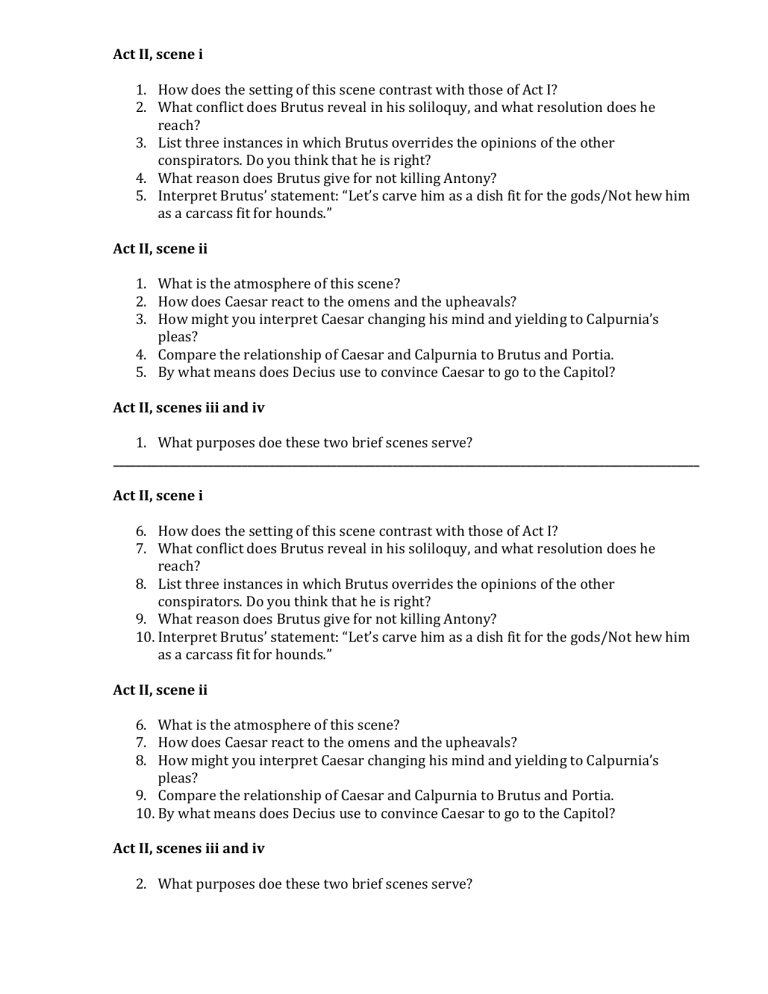
Act II, scene i
1.
How does the setting of this scene contrast with those of Act I?
2.
What conflict does Brutus reveal in his soliloquy, and what resolution does he reach?
3.
List three instances in which Brutus overrides the opinions of the other conspirators. Do you think that he is right?
4.
What reason does Brutus give for not killing Antony?
5.
Interpret Brutus’ statement: “Let’s carve him as a dish fit for the gods/Not hew him as a carcass fit for hounds.”
Act II, scene ii
1.
What is the atmosphere of this scene?
2.
How does Caesar react to the omens and the upheavals?
3.
How might you interpret Caesar changing his mind and yielding to Calpurnia’s pleas?
4.
Compare the relationship of Caesar and Calpurnia to Brutus and Portia.
5.
By what means does Decius use to convince Caesar to go to the Capitol?
Act II, scenes iii and iv
1.
What purposes doe these two brief scenes serve?
_________________________________________________________________________________________________________
Act II, scene i
6.
How does the setting of this scene contrast with those of Act I?
7.
What conflict does Brutus reveal in his soliloquy, and what resolution does he reach?
8.
List three instances in which Brutus overrides the opinions of the other conspirators. Do you think that he is right?
9.
What reason does Brutus give for not killing Antony?
10.
Interpret Brutus’ statement: “Let’s carve him as a dish fit for the gods/Not hew him as a carcass fit for hounds.”
Act II, scene ii
6.
What is the atmosphere of this scene?
7.
How does Caesar react to the omens and the upheavals?
8.
How might you interpret Caesar changing his mind and yielding to Calpurnia’s pleas?
9.
Compare the relationship of Caesar and Calpurnia to Brutus and Portia.
10.
By what means does Decius use to convince Caesar to go to the Capitol?
Act II, scenes iii and iv
2.
What purposes doe these two brief scenes serve?
Act III, scene i
1.
What is Caesar’s response to Metellus Cimber?
2.
What character trait does Caesar recognize in himself? Explain his meaning using quotations from the play.
3.
What are Caesar’s last words? Explain their meaning.
4.
What does Antony suggest to the conspirators in his opening speech in this scene?
5.
Cite lines from the play which indicate that Antony’s feelings for Caesar are unchanged. What is Antony’s plan?
Act III, scene ii
1.
Why do the people divide themselves between Brutus and Cassius to hear their stories?
2.
What reason(s) does Brutus give for killing Caesar?
3.
How does Antony describe Caesar in his “Friends, Romans, countrymen…” speech?
4.
Find the irony in Antony’s “Good friends, sweet friends…” speech.
5.
What does Caesar leave to the Roman people?
Act III, scene iii
1.
What confusion occurs in this scene?
2.
What does the scene reveal about the mob?
_________________________________________________________________________________________________________
Act III, scene i
6.
What is Caesar’s response to Metellus Cimber?
7.
What character trait does Caesar recognize in himself? Explain his meaning using quotations from the play.
8.
What are Caesar’s last words? Explain their meaning.
9.
What does Antony suggest to the conspirators in his opening speech in this scene?
10.
Cite lines from the play which indicate that Antony’s feelings for Caesar are unchanged. What is Antony’s plan?
Act III, scene ii
6.
Why do the people divide themselves between Brutus and Cassius to hear their stories?
7.
What reason(s) does Brutus give for killing Caesar?
8.
How does Antony describe Caesar in his “Friends, Romans, countrymen…” speech?
9.
Find the irony in Antony’s “Good friends, sweet friends…” speech.
10.
What does Caesar leave to the Roman people?
Act III, scene iii
3.
What confusion occurs in this scene?
4.
What does the scene reveal about the mob?



